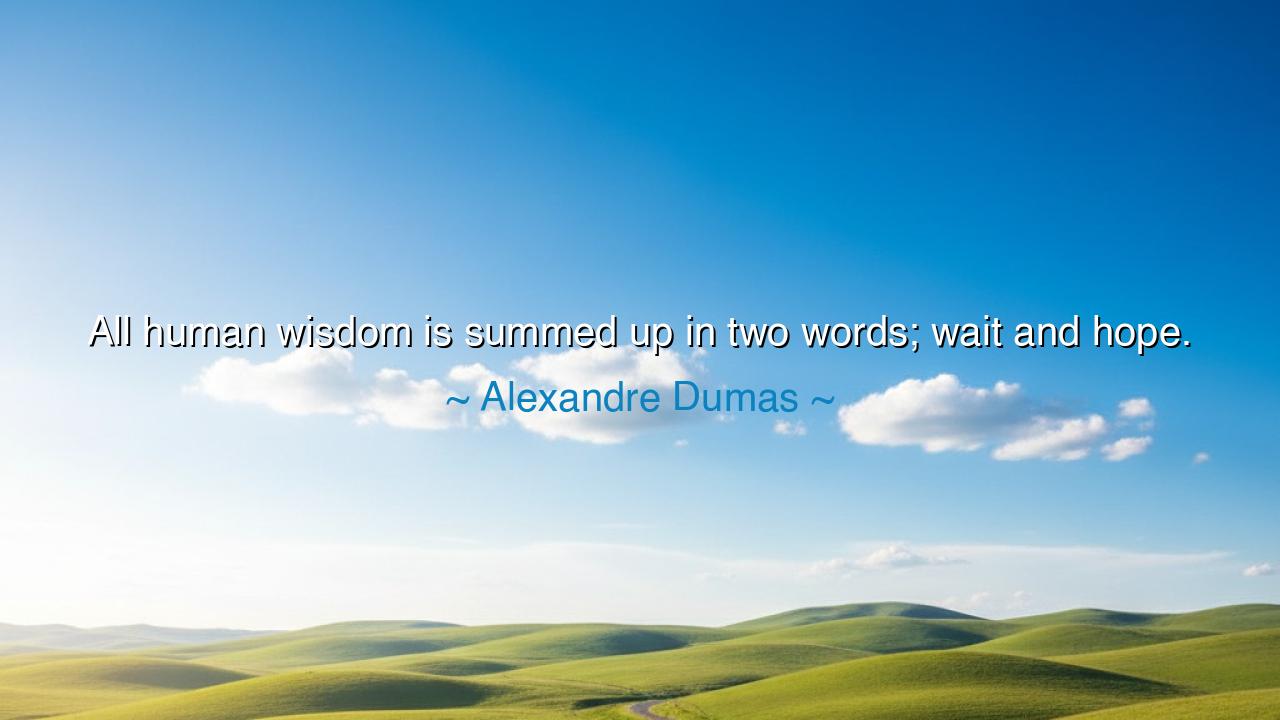
All human wisdom is summed up in two words; wait and hope.






In the immortal words of Alexandre Dumas, the master storyteller of courage and destiny, we find a truth both simple and infinite: “All human wisdom is summed up in two words; wait and hope.” These words, uttered near the end of The Count of Monte Cristo, carry the distilled essence of human endurance — the wisdom that sustains us when strength fails and the world seems unjust. Dumas, who wrote of betrayal, suffering, and redemption, understood that life’s greatest victories are not won by force, but by patience and faith — by the quiet strength to endure what cannot be changed, and the sacred light to believe in what cannot yet be seen.
To wait is to trust the unfolding of time. The impatient heart demands that life yield its treasures immediately, but time is a sculptor whose hands move slowly, shaping both destiny and soul. Waiting is not passivity; it is discipline, the art of stillness in motion. It is the faith that every storm passes, that every winter hides a spring. To hope, then, is to hold the flame of vision against the winds of despair — to look into the darkness and say, “Still, there is meaning. Still, there is light.” In the union of these two virtues, waiting and hoping, lies the very rhythm of human life: to endure and to believe, to struggle and to dream.
The origin of this wisdom comes from the heart of The Count of Monte Cristo, Dumas’ great tale of vengeance and forgiveness. Its hero, Edmond Dantès, is unjustly imprisoned in the darkness of Château d’If, robbed of youth, love, and freedom. For years he knows nothing but stone and silence. Yet within that dungeon, through endless days of despair, he learns the lesson that defines his soul: that time, though cruel, can also redeem. His escape and eventual triumph are not born of rage alone, but of endurance — of waiting through agony, of hoping against reason. And when his journey ends, when he has gained the world but lost illusions, he turns to those who remain and says these immortal words: “All human wisdom is summed up in two words; wait and hope.”
Consider, too, the story of Nelson Mandela, who, like Dantès, spent long years imprisoned for a dream others could not yet see. For twenty-seven years, he waited within walls meant to break him, yet he never allowed hatred to claim his heart. When he emerged, he did not preach vengeance but reconciliation. His hope was not a naive wish for comfort, but a fierce conviction that justice would bloom in its season. Mandela lived Dumas’ wisdom: that history bends not to the impatient, but to those who can wait with purpose and hope with vision.
To wait is an act of humility — to accept that not all answers come in our time. To hope is an act of courage — to believe that goodness endures, even when the world grows dark. The foolish think wisdom lies in action alone; the wise know it lies in knowing when not to act, when to let time ripen what our hands cannot yet harvest. The farmer does not curse the seed for sleeping; he waits for the sun. So too must we learn that what we desire most — justice, love, peace, meaning — cannot be forced. They must mature within the soul, and their arrival will be sweeter for the patience that guarded them.
And yet, Dumas’ teaching is not a call to inaction. To wait and hope does not mean to sit idle, but to walk steadily through life’s trials without surrendering to bitterness. Hope is the torch that guides the traveler through the fog; waiting is the strength that keeps him walking. The one who waits without hope will wither in despair; the one who hopes without patience will burn out in restlessness. Only together do they create endurance — the quiet heroism that transforms suffering into wisdom and loss into clarity.
Let this be the lesson to all who seek peace in uncertain times: Learn to wait without fear, and to hope without guarantee. Trust that what is yours will come, not when you demand it, but when you are ready to receive it. Do not rush the unfolding of fate; let it teach you as it unfolds. In moments of struggle, whisper these words to yourself as a sacred mantra: “Wait and hope.” For as Dumas reminds us, all the philosophies of men and all the faiths of ages are bound in this truth — that the soul which endures and believes can never be defeated.
And so, my children, remember the wisdom of Alexandre Dumas: that to wait is to honor time, and to hope is to honor life. In these two acts lies the entire art of living. When the path is uncertain, when your heart is weary, when you stand at the edge of despair — do not curse the silence. Instead, wait with patience, hope with courage, and trust that beyond the horizon, something greater stirs. For those who wait and hope do not merely survive; they transcend.






AAdministratorAdministrator
Welcome, honored guests. Please leave a comment, we will respond soon